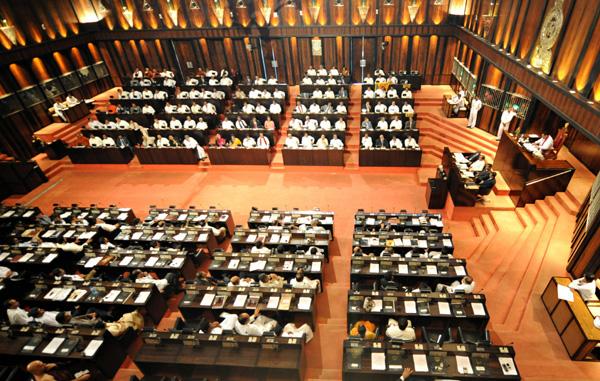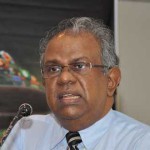A Brief Colonial History Of Ceylon(SriLanka)
Sri Lanka: One Island Two Nations
A Brief Colonial History Of Ceylon(SriLanka)
Sri Lanka: One Island Two Nations
(Full Story)
Search This Blog
Back to 500BC.
==========================
Thiranjala Weerasinghe sj.- One Island Two Nations
?????????????????????????????????????????????????Wednesday, May 30, 2018
A Special Experts Committee To Finalize Constitutional Reforms


Additional Secretary to the Constitutional Assembly
Constitutional Assembly,
Parliament of Sri Lanka.
Parliamentary Complex,
Sri Jayewardenepura,
Kotte.
Dear Madm,
A Special Experts Committee to Finalize Constitutional Reforms
I address this note consequent to a media report stating that the Prime
Minister, following an appeal by the Leader of the Opposition, has
instructed the special Experts Committee of the Constitutional Assembly
to finalize the Constitutional Reform proposals, taking account of the
six experts sub-committee reports already received.
I take the liberty of making this repeat submission, setting out in
summary 10 points, which I firmly believe to be essential areas of
reform, critical in assuring socio economic good governance and thus
must be reflected within the finalized constitutional reforms
submissions of the special Experts Committee:
1. Reforms Defining the Independence, Role, Responsibility and Accountability of Chief Accounting Officers/Ministry Secretaries
There is a need to clearly define and separate by way of a
Constitutional amendment, the role, responsibilities and accountability
division between the head of department (the Ministry Secretary /Chief
Accounting Officer) and the political head (called the ‘executive
authority’ being either the Minister or the Deputy Minister or even the
Cabinet of Ministers).
The executive authority is responsible for setting out policy choices
and desired outcomes, while the chief accounting officer develops
essential concepts in support of selected policy choices, plans and
implements the policy /guidelines set by the political authority. It is
the accountability of the Chief Accounting Officer to take all executive
decisions in the implementation of plans; and take all other steps and
issue executive orders, which leads to the realization of the outcomes.
For this purpose, the Chief Accounting Officer assumes responsibility
for delivering the outputs defined in the departmental budget. Thus the
Constitution must empower the chief accounting officers by unambiguously
conferring on them a clear set of responsibilities. The chief
accounting officer prepares the departmental budget (specified in terms
of measurable objectives) for the Minister to approve and present to the
legislature for voting. The chief accounting officer is then
responsible for implementing and managing the budget.
In pursuit of above essential reform:
a) Amend the provisions of Article 52(2) of the Constitution to ensure that, the
Ministers will henceforth only engage in setting policy; and will not
discharge the expanded responsibilities of direction and control endowed
in them post the 1972 Constitution; and thus ensure that Ministers will
leave all responsibilities connected with the supervision, direction
and control of the Ministries, Departments and other Institutions under
the Ministry to the Secretary of the Ministry, who will henceforth be duly accountable for such expanded responsibility.
b) Amend the provisions of Article 52(3) of the Constitution whereby, the
Secretaries of Ministries will not be changed with every change of the
Cabinet of Ministers; or with the change of a Minister.
c) Amend the provisions of Article 55(2) of the Constitution to assure that, the
appointment, promotion, transfer, disciplinary control and dismissal of
all Heads of Departments shall, vest in the Cabinet of Ministers, but
be subject to the transparent and due independent evaluation and
recommendations of the Public Services Commission and the Constitutional
Council.
2. Correctly Represent the Duties and Functions of the Auditor General, determined based on the English version of the Article 154 of the Constitution, thereby amending the wrong and restrictive interpretation given in the Sinhalese version.
3. In
Chapter VIII of the Constitution dealing with the Cabinet of Ministers
and Secretaries, include new provisions to require that
a) all members of the Cabinet ( including the President where he holds
office concurrently as a Minister) and the Secretaries of Ministries be
required to declare to the Secretary to the Cabinet, a complete schedule
of personal and family ( family being the spouse, children, step
children, brothers, sisters, parents and in-laws ) interests in
businesses, professions, contracts, etc and all related party entity
interests, connected to the member and his family; and undertake to make
a declaration, where ever a conflict of such interests arise or is
deemed likely to arise, in connection with any state business,
appointment or transaction, either directly or indirectly connected to
the Minister and/ or his family. The Secretary to the Cabinet shall duly
maintain the relevant Register of Interests.
b) All members of the Cabinet ( including the President where he holds
office concurrently as a Minister) and the Secretaries of Ministries to
undertake annually by sworn affidavit submitted to the Secretary to the
Cabinet, that they will not receive, collect, claim, make arrangements
for accommodation/collection, or facilitation either directly or
indirectly, of any payments, funds, investments, assets, transfer and
holding of beneficial interests, benefits, perks, gratuitous receipts in
kind or otherwise, from the State, any Ministry, Department, Public
Corporation or Company of the state, directly or indirectly, whether
fully or partly owned by the State, or any private entity or any other
form of corporate entity, local or overseas, with whom the state has any
business or other connections; and that any such benefits received or
held to the beneficial interests will be duly reported to the Secretary
to the Cabinet and copied to the Auditor General, by the Minister and or
his family members and by any individual or institution making such
benefits available to the Minister or family
c) Any member of the Cabinet( including the President where he holds office concurrently as a Minister) or
any Secretary who knows or has reason to believe from information or
other matters connected to or obtained by him in the course of carrying
on his responsibilities and functions of office, that any or regulation
for the time being in force has been violated or is likely to be
violated or that any property owned or held in beneficial interest by
any person has been derived or realized from any unlawful activity, any
such member of Cabinet or any Secretary shall disclose his knowledge or
belief as soon as is practicable, to the Secretary to the Cabinet who
shall deal with that information in terms of the laws, regulations and
rule of law enforcement stipulations.
4. Amend
Article 55 (2) to read as “The appointment, promotion, transfer,
disciplinary control and dismissal of all Secretaries, Heads of
Department and any
persons holding office at the level of an Ambassador, High
Commissioner, Director, Chief Executive, Departmental Head (including a
position of a Deputy or Assistant Departmental Head) of the State, a
Ministry, a Department, Public Institution, Public Corporation, Public
Private Partnership Company or Regulatory Body, shall, vest in the Cabinet of Ministers upon such appointment promotion, transfer, disciplinary control and dismissal being reviewed and recommended by the Constitutional Council.
5. Annual Certification by Chief Accounting Officers/Heads of Functions
In order that all key Chief Accounting Officers and Office Holders
specified in Article 52 (4) of the Constitution duly discharge their
Accountability for Public Finances, State Assets and Liabilities
management, upholding principles of transparency, good governance in
compliance with codes of ethics and conduct befitting their office and
in compliance with laws and regulations require such Chief Accounting
Officers and key Public Officials to file before the Secretary to the
Cabinet a Certificate annually, in the form of affidavits stating that
they together with their key supporting Officers, have in the course of
the discharge of their duties and responsibilities of office have to the
best of their knowledge and belief acted as “fit and proper” persons.

